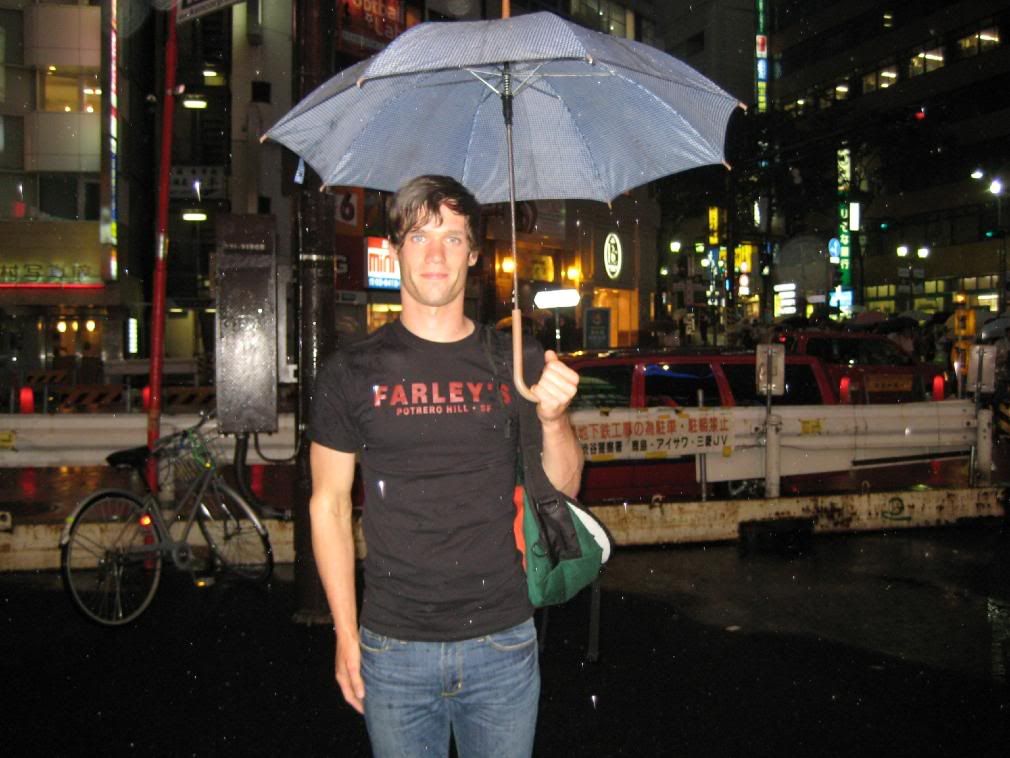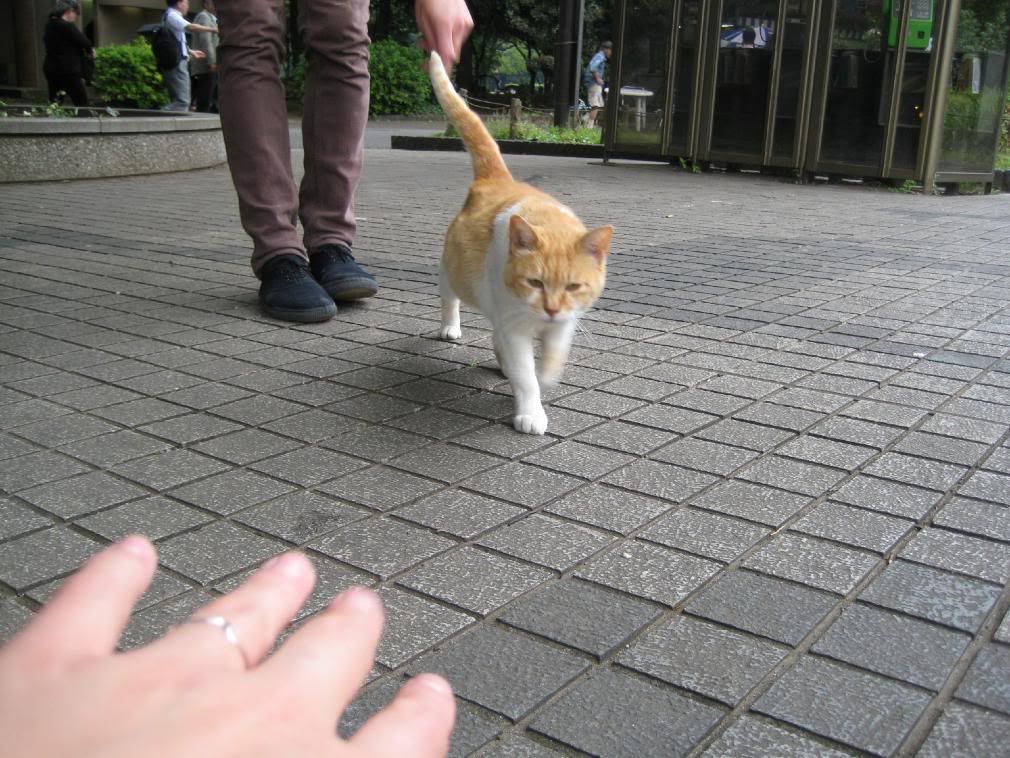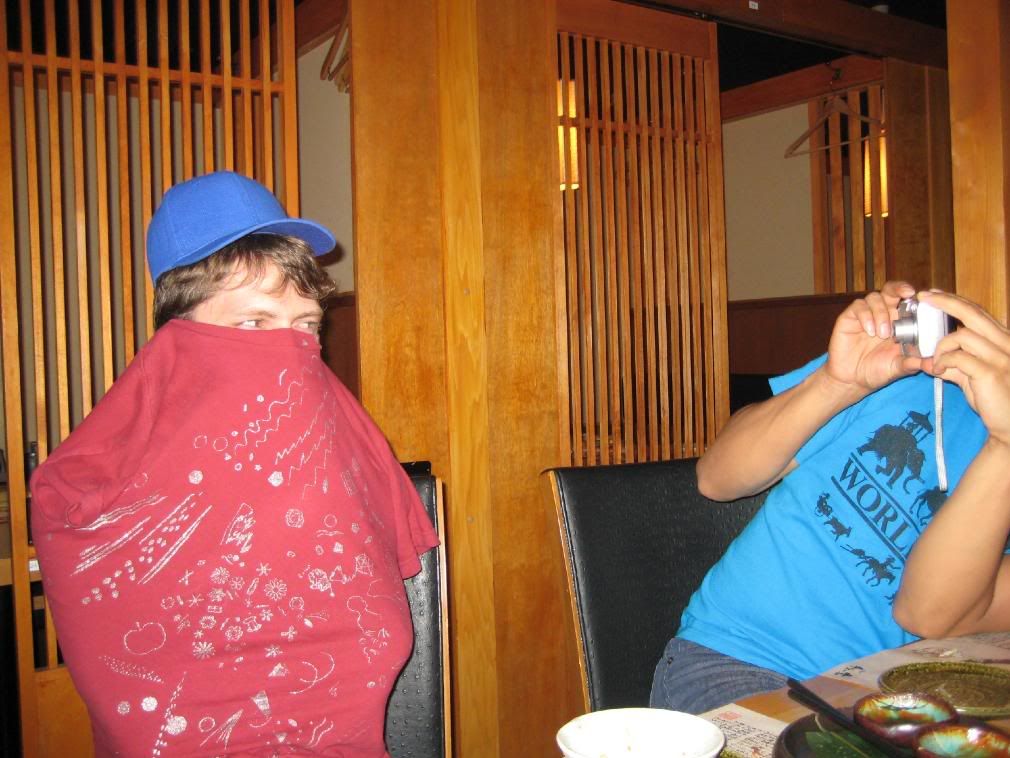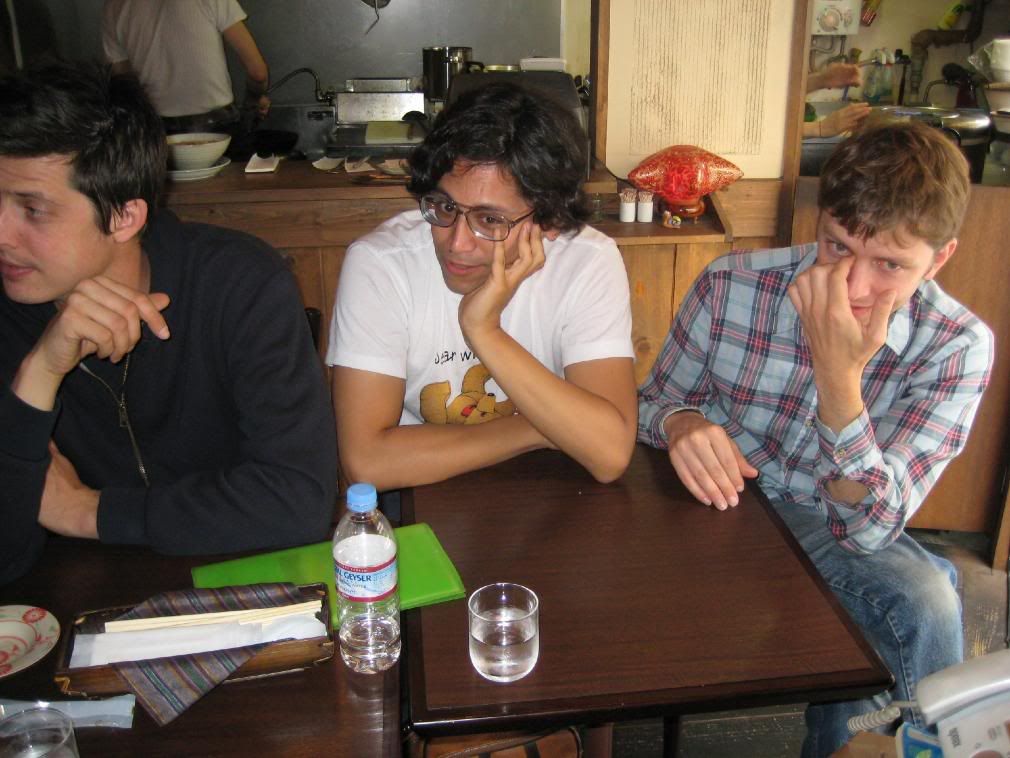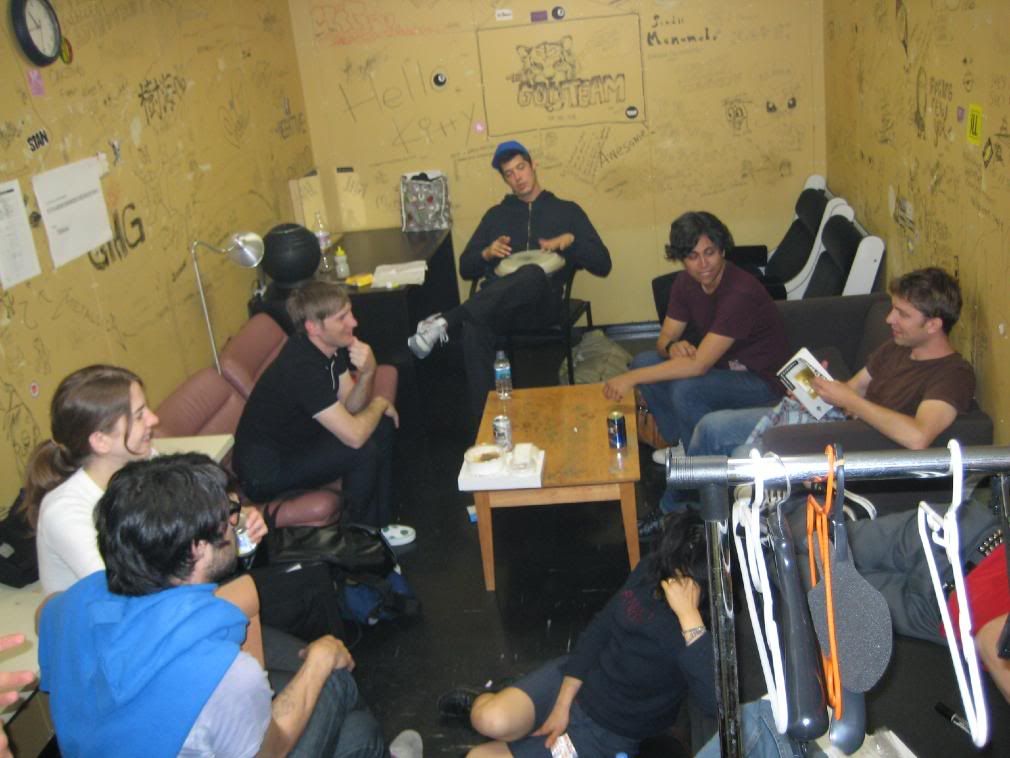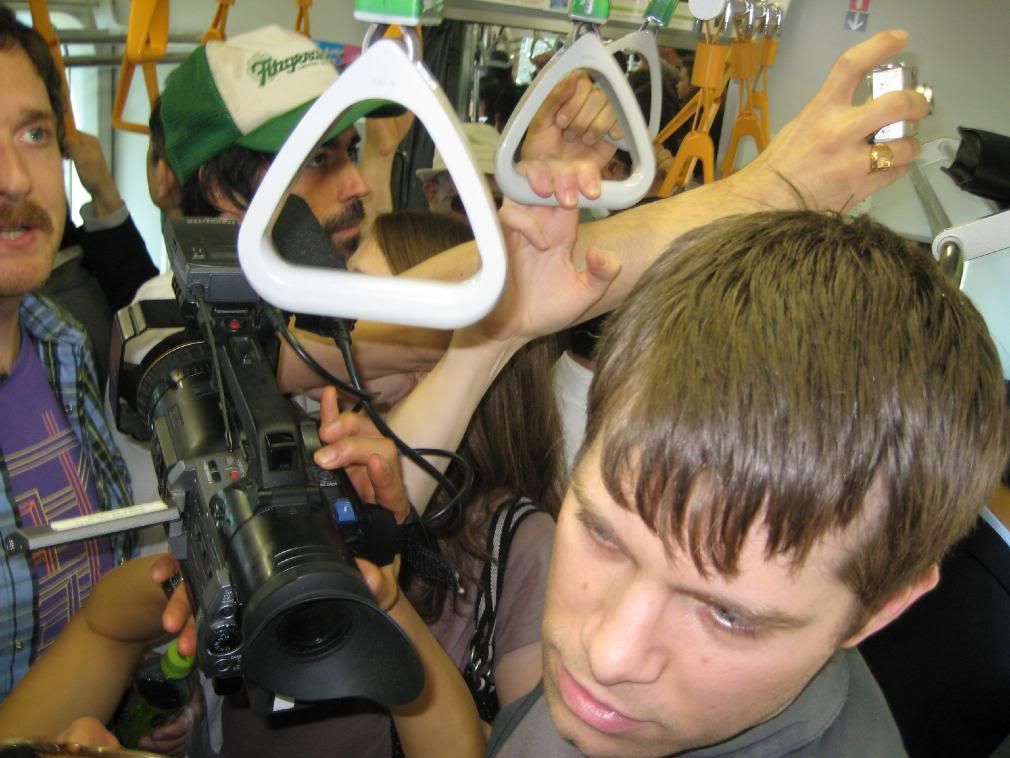
|
|||
| Contacts Tour Buy on iTunes Ringtones j-morrison.com | |||
Monday, June 30this made me laugh so hard i almost puked
http://www.myspace.com/xiuxiutangclan
happy fourth of july (the last paragraph is the killer)
Preparing the Battlefield
The Bush Administration Steps up Clandestine Efforts Against Iran by Seymour M. Hersh July 7, 2008 Late last year, Congress agree to a request from Presiden Bush to fund a major escalation o covert operations against Iran according to current and forme military, intelligence, an congressional sources. Thes operations, for which the Presiden sought up to four hundred millio dollars, were described in Presidential Finding signed b Bush, and are designed t destabilize the country’s religiou leadership. The covert activitie involve support of the minorit Ahwazi Arab and Baluchi group and other dissident organizations They also include gatherin intelligence about Iran’s suspecte nuclear-weapons program Clandestine operations against Iran are not new. United States Special Operations Forces have been conducting cross-border operations from southern Iraq, with Presidential authorization, since last year. These have included seizing members of Al Quds, the commando arm of the Iranian Revolutionary Guard, and taking them to Iraq for interrogation, and the pursuit of “high-value targets” in the President’s war on terror, who may be captured or killed. But the scale and the scope of the operations in Iran, which involve the Central Intelligence Agency and the Joint Special Operations Command (JSOC), have now been significantly expanded, according to the current and former officials. Many of these activities are not specified in the new Finding, and some congressional leaders have had serious questions about their nature. Under federal law, a Presidential Finding, which is highly classified, must be issued when a covert intelligence operation gets under way and, at a minimum, must be made known to Democratic and Republican leaders in the House and the Senate and to the ranking members of their respective intelligence committees—the so-called Gang of Eight. Money for the operation can then be reprogrammed from previous appropriations, as needed, by the relevant congressional committees, which also can be briefed. “The Finding was focussed on undermining Iran’s nuclear ambitions and trying to undermine the government through regime change,” a person familiar with its contents said, and involved “working with opposition groups and passing money.” The Finding provided for a whole new range of activities in southern Iran and in the areas, in the east, where Baluchi political opposition is strong, he said. Although some legislators were troubled by aspects of the Finding, and “there was a significant amount of high-level discussion” about it, according to the source familiar with it, the funding for the escalation was approved. In other words, some members of the Democratic leadership—Congress has been under Democratic control since the 2006 elections—were willing, in secret, to go along with the Administration in expanding covert activities directed at Iran, while the Party’s presumptive candidate for President, Barack Obama, has said that he favors direct talks and diplomacy. The request for funding came in the same period in which the Administration was coming to terms with a National Intelligence Estimate, released in December, that concluded that Iran had halted its work on nuclear weapons in 2003. The Administration downplayed the significance of the N.I.E., and, while saying that it was committed to diplomacy, continued to emphasize that urgent action was essential to counter the Iranian nuclear threat. President Bush questioned the N.I.E.’s conclusions, and senior national-security officials, including Secretary of Defense Robert Gates and Secretary of State Condoleezza Rice, made similar statements. (So did Senator John McCain, the presumptive Republican Presidential nominee.) Meanwhile, the Administration also revived charges that the Iranian leadership has been involved in the killing of American soldiers in Iraq: both directly, by dispatching commando units into Iraq, and indirectly, by supplying materials used for roadside bombs and other lethal goods. (There have been questions about the accuracy of the claims; the Times, among others, has reported that “significant uncertainties remain about the extent of that involvement.”) Military and civilian leaders in the Pentagon share the White House’s concern about Iran’s nuclear ambitions, but there is disagreement about whether a military strike is the right solution. Some Pentagon officials believe, as they have let Congress and the media know, that bombing Iran is not a viable response to the nuclear-proliferation issue, and that more diplomacy is necessary. A Democratic senator told me that, late last year, in an off-the-record lunch meeting, Secretary of Defense Gates met with the Democratic caucus in the Senate. (Such meetings are held regularly.) Gates warned of the consequences if the Bush Administration staged a preëmptive strike on Iran, saying, as the senator recalled, “We’ll create generations of jihadists, and our grandchildren will be battling our enemies here in America.” Gates’s comments stunned the Democrats at the lunch, and another senator asked whether Gates was speaking for Bush and Vice-President Dick Cheney. Gates’s answer, the senator told me, was “Let’s just say that I’m here speaking for myself.” (A spokesman for Gates confirmed that he discussed the consequences of a strike at the meeting, but would not address what he said, other than to dispute the senator’s characterization.) The Joint Chiefs of Staff, whose chairman is Admiral Mike Mullen, were “pushing back very hard” against White House pressure to undertake a military strike against Iran, the person familiar with the Finding told me. Similarly, a Pentagon consultant who is involved in the war on terror said that “at least ten senior flag and general officers, including combatant commanders”—the four-star officers who direct military operations around the world—“have weighed in on that issue.” The most outspoken of those officers is Admiral William Fallon, who until recently was the head of U.S. Central Command, and thus in charge of American forces in Iraq and Afghanistan. In March, Fallon resigned under pressure, after giving a series of interviews stating his reservations about an armed attack on Iran. For example, late last year he told the Financial Times that the “real objective” of U.S. policy was to change the Iranians’ behavior, and that “attacking them as a means to get to that spot strikes me as being not the first choice.” Admiral Fallon acknowledged, when I spoke to him in June, that he had heard that there were people in the White House who were upset by his public statements. “Too many people believe you have to be either for or against the Iranians,” he told me. “Let’s get serious. Eighty million people live there, and everyone’s an individual. The idea that they’re only one way or another is nonsense.” When it came to the Iraq war, Fallon said, “Did I bitch about some of the things that were being proposed? You bet. Some of them were very stupid.” The Democratic leadership’s agreement to commit hundreds of millions of dollars for more secret operations in Iran was remarkable, given the general concerns of officials like Gates, Fallon, and many others. “The oversight process has not kept pace—it’s been coöpted” by the Administration, the person familiar with the contents of the Finding said. “The process is broken, and this is dangerous stuff we’re authorizing.” Senior Democrats in Congress told me that they had concerns about th possibility that their understanding of what the new operations entail differ from the White House’s. One issue has to do with a reference in the Finding, th person familiar with it recalled, to potential defensive lethal action by U.S operatives in Iran. (In early May, the journalist Andrew Cockburn publishe elements of the Finding in Counterpunch, a newsletter and online magazine.) The language was inserted into the Finding at the urging of the C.I.A., a former senior intelligence official said. The covert operations set forth in the Finding essentially run parallel to those of a secret military task force, now operating in Iran, that is under the control of JSOC. Under the Bush Administration’s interpretation of the law, clandestine military activities, unlike covert C.I.A. operations, do not need to be depicted in a Finding, because the President has a constitutional right to command combat forces in the field without congressional interference. But the borders between operations are not always clear: in Iran, C.I.A. agents and regional assets have the language skills and the local knowledge to make contacts for the JSOC operatives, and have been working with them to direct personnel, matériel, and money into Iran from an obscure base in western Afghanistan. As a result, Congress has been given only a partial view of how the money it authorized may be used. One of JSOC’s task-force missions, the pursuit of “high-value targets,” was not directly addressed in the Finding. There is a growing realization among some legislators that the Bush Administration, in recent years, has conflated what is an intelligence operation and what is a military one in order to avoid fully informing Congress about what it is doing. “This is a big deal,” the person familiar with the Finding said. “The C.I.A. needed the Finding to do its traditional stuff, but the Finding does not apply to JSOC. The President signed an Executive Order after September 11th giving the Pentagon license to do things that it had never been able to do before without notifying Congress. The claim was that the military was ‘preparing the battle space,’ and by using that term they were able to circumvent congressional oversight. Everything is justified in terms of fighting the global war on terror.” He added, “The Administration has been fuzzing the lines; there used to be a shade of gray”—between operations that had to be briefed to the senior congressional leadership and those which did not—“but now it’s a shade of mush.” “The agency says we’re not going to get in the position of helping to kill people without a Finding,” the former senior intelligence official told me. He was referring to the legal threat confronting some agency operatives for their involvement in the rendition and alleged torture of suspects in the war on terror. “This drove the military people up the wall,” he said. As far as the C.I.A. was concerned, the former senior intelligence official said, “the over-all authorization includes killing, but it’s not as though that’s what they’re setting out to do. It’s about gathering information, enlisting support.” The Finding sent to Congress was a compromise, providing legal cover for the C.I.A. while referring to the use of lethal force in ambiguous terms. The defensive-lethal language led some Democrats, according to congressional sources familiar with their views, to call in the director of the C.I.A., Air Force General Michael V. Hayden, for a special briefing. Hayden reassured the legislators that the language did nothing more than provide authority for Special Forces operatives on the ground in Iran to shoot their way out if they faced capture or harm. The legislators were far from convinced. One congressman subsequently wrote a personal letter to President Bush insisting that “no lethal action, period” had been authorized within Iran’s borders. As of June, he had received no answer. Members of Congress have expressed skepticism in the past about the information provided by the White House. On March 15, 2005, David Obey, then the ranking Democrat on the Republican-led House Appropriations Committee, announced that he was putting aside an amendment that he had intended to offer that day, and that would have cut off all funding for national-intelligence programs unless the President agreed to keep Congress fully informed about clandestine military activities undertaken in the war on terror. He had changed his mind, he said, because the White House promised better coöperation. “The Executive Branch understands that we are not trying to dictate what they do,” he said in a floor speech at the time. “We are simply trying to see to it that what they do is consistent with American values and will not get the country in trouble.” Obey declined to comment on the specifics of the operations in Iran, but he did tell me that the White House reneged on its promise to consult more fully with Congress. He said, “I suspect there’s something going on, but I don’t know what to believe. Cheney has always wanted to go after Iran, and if he had more time he’d find a way to do it. We still don’t get enough information from the agencies, and I have very little confidence that they give us information on the edge.” None of the four Democrats in the Gang of Eight—Senate Majority Leader Harry Reid, House Speaker Nancy Pelosi, Senate Intelligence Committee chairman John D. Rockefeller IV, and House Intelligence Committee chairman Silvestre Reyes—would comment on the Finding, with some noting that it was highly classified. An aide to one member of the Democratic leadership responded, on his behalf, by pointing to the limitations of the Gang of Eight process. The notification of a Finding, the aide said, “is just that—notification, and not a sign-off on activities. Proper oversight of ongoing intelligence activities is done by fully briefing the members of the intelligence committee.” However, Congress does have the means to challenge the White House once it has been sent a Finding. It has the power to withhold funding for any government operation. The members of the House and Senate Democratic leadership who have access to the Finding can also, if they choose to do so, and if they have shared concerns, come up with ways to exert their influence on Administration policy. (A spokesman for the C.I.A. said, “As a rule, we don’t comment one way or the other on allegations of covert activities or purported findings.” The White House also declined to comment.) A member of the House Appropriations Committee acknowledged that, even with a Democratic victory in November, “it will take another year before we get the intelligence activities under control.” He went on, “We control the money and they can’t do anything without the money. Money is what it’s all about. But I’m very leery of this Administration.” He added, “This Administration has been so secretive.” One irony of Admiral Fallon’s departure is that he was, in many areas, i agreement with President Bush on the threat posed by Iran. They had a goo working relationship, Fallon told me, and, when he ran CENTCOM, were in regular communication. On March 4th, a week before his resignation, Fallon testified before the Senate Armed Services Committee, saying that he was “encouraged” about the situations in Iraq and Afghanistan. Regarding the role played by Iran’s leaders, he said, “They’ve been absolutely unhelpful, very damaging, and I absolutely don’t condone any of their activities. And I have yet to see anything since I’ve been in this job in the way of a public action by Iran that’s been at all helpful in this region.” Fallon made it clear in our conversations that he considered it inappropriate to comment publicly about the President, the Vice-President, or Special Operations. But he said he had heard that people in the White House had been “struggling” with his views on Iran. “When I arrived at CENTCOM, the Iranians were funding every entity inside Iraq. It was in their interest to get us out, and so they decided to kill as many Americans as they could. And why not? They didn’t know who’d come out ahead, but they wanted us out. I decided that I couldn’t resolve the situation in Iraq without the neighborhood. To get this problem in Iraq solved, we had to somehow involve Iran and Syria. I had to work the neighborhood.” Fallon told me that his focus had been not on the Iranian nuclear issue, or on regime change there, but on “putting out the fires in Iraq.” There were constant discussions in Washington and in the field about how to engage Iran and, on the subject of the bombing option, Fallon said, he believed that “it would happen only if the Iranians did something stupid.” Fallon’s early retirement, however, appears to have been provoked not only by his negative comments about bombing Iran but also by his strong belief in the chain of command and his insistence on being informed about Special Operations in his area of responsibility. One of Fallon’s defenders is retired Marine General John J. (Jack) Sheehan, whose last assignment was as commander-in-chief of the U.S. Atlantic Command, where Fallon was a deputy. Last year, Sheehan rejected a White House offer to become the President’s “czar” for the wars in Iraq and Afghanistan. “One of the reasons the White House selected Fallon for CENTCOM was that he’s known to be a strategic thinker and had demonstrated those skills in the Pacific,” Sheehan told me. (Fallon served as commander-in-chief of U.S. forces in the Pacific from 2005 to 2007.) “He was charged with coming up with an over-all coherent strategy for Iran, Iraq, and Afghanistan, and, by law, the combatant commander is responsible for all military operations within his A.O.”—area of operations. “That was not happening,” Sheehan said. “When Fallon tried to make sense of all the overt and covert activity conducted by the military in his area of responsibility, a small group in the White House leadership shut him out.” The law cited by Sheehan is the 1986 Defense Reorganization Act, known as Goldwater-Nichols, which defined the chain of command: from the President to the Secretary of Defense, through the chairman of the Joint Chiefs of Staff, and on to the various combatant commanders, who were put in charge of all aspects of military operations, including joint training and logistics. That authority, the act stated, was not to be shared with other echelons of command. But the Bush Administration, as part of its global war on terror, instituted new policies that undercut regional commanders-in-chief; for example, it gave Special Operations teams, at military commands around the world, the highest priority in terms of securing support and equipment. The degradation of the traditional chain of command in the past few years has been a point of tension between the White House and the uniformed military. “The coherence of military strategy is being eroded because of undue civilian influence and direction of nonconventional military operations,” Sheehan said. “If you have small groups planning and conducting military operations outside the knowledge and control of the combatant commander, by default you can’t have a coherent military strategy. You end up with a disaster, like the reconstruction efforts in Iraq.” Admiral Fallon, who is known as Fox, was aware that he would face special difficulties as the first Navy officer to lead CENTCOM, which had always been headed by a ground commander, one of his military colleagues told me. He was also aware that the Special Operations community would be a concern. “Fox said that there’s a lot of strange stuff going on in Special Ops, and I told him he had to figure out what they were really doing,” Fallon’s colleague said. “The Special Ops guys eventually figured out they needed Fox, and so they began to talk to him. Fox would have won his fight with Special Ops but for Cheney.” The Pentagon consultant said, “Fallon went down because, in his own way, he was trying to prevent a war with Iran, and you have to admire him for that.” In recent months, according to the Iranian media, there has been a surge i violence in Iran; it is impossible at this early stage, however, to credit JSOC or C.I.A. activities, or to assess their impact on the Iranian leadership. The Iranian press reports are being carefully monitored by retired Air Force Colonel Sam Gardiner, who has taught strategy at the National War College and now conducts war games centered on Iran for the federal government, think tanks, and universities. The Iranian press “is very open in describing the killings going on inside the country,” Gardiner said. It is, he said, “a controlled press, which makes it more important that it publishes these things. We begin to see inside the government.” He added, “Hardly a day goes by now we don’t see a clash somewhere. There were three or four incidents over a recent weekend, and the Iranians are even naming the Revolutionary Guard officers who have been killed.” Earlier this year, a militant Ahwazi group claimed to have assassinated a Revolutionary Guard colonel, and the Iranian government acknowledged that an explosion in a cultural center in Shiraz, in the southern part of the country, which killed at least twelve people and injured more than two hundred, had been a terrorist act and not, as it earlier insisted, an accident. It could not be learned whether there has been American involvement in any specific incident in Iran, but, according to Gardiner, the Iranians have begun publicly blaming the U.S., Great Britain, and, more recently, the C.I.A. for some incidents. The agency was involved in a coup in Iran in 1953, and its support for the unpopular regime of Shah Mohammed Reza Pahlavi—who was overthrown in 1979—was condemned for years by the ruling mullahs in Tehran, to great effect. “This is the ultimate for the Iranians—to blame the C.I.A.,” Gardiner said. “This is new, and it’s an escalation—a ratcheting up of tensions. It rallies support for the regime and shows the people that there is a continuing threat from the ‘Great Satan.’ ” In Gardiner’s view, the violence, rather than weakening Iran’s religious government, may generate support for it. Many of the activities may be being carried out by dissidents in Iran, and not by Americans in the field. One problem with “passing money” (to use the term of the person familiar with the Finding) in a covert setting is that it is hard to control where the money goes and whom it benefits. Nonetheless, the former senior intelligence official said, “We’ve got exposure, because of the transfer of our weapons and our communications gear. The Iranians will be able to make the argument that the opposition was inspired by the Americans. How many times have we tried this without asking the right questions? Is the risk worth it?” One possible consequence of these operations would be a violent Iranian crackdown on one of the dissident groups, which could give the Bush Administration a reason to intervene. A strategy of using ethnic minorities to undermine Iran is flawed, according to Vali Nasr, who teaches international politics at Tufts University and is also a senior fellow at the Council on Foreign Relations. “Just because Lebanon, Iraq, and Pakistan have ethnic problems, it does not mean that Iran is suffering from the same issue,” Nasr told me. “Iran is an old country—like France and Germany—and its citizens are just as nationalistic. The U.S. is overestimating ethnic tension in Iran.” The minority groups that the U.S. is reaching out to are either well integrated or small and marginal, without much influence on the government or much ability to present a political challenge, Nasr said. “You can always find some activist groups that will go and kill a policeman, but working with the minorities will backfire, and alienate the majority of the population.” The Administration may have been willing to rely on dissident organizations in Iran even when there was reason to believe that the groups had operated against American interests in the past. The use of Baluchi elements, for example, is problematic, Robert Baer, a former C.I.A. clandestine officer who worked for nearly two decades in South Asia and the Middle East, told me. “The Baluchis are Sunni fundamentalists who hate the regime in Tehran, but you can also describe them as Al Qaeda,” Baer told me. “These are guys who cut off the heads of nonbelievers—in this case, it’s Shiite Iranians. The irony is that we’re once again working with Sunni fundamentalists, just as we did in Afghanistan in the nineteen-eighties.” Ramzi Yousef, who was convicted for his role in the 1993 bombing of the World Trade Center, and Khalid Sheikh Mohammed, who is considered one of the leading planners of the September 11th attacks, are Baluchi Sunni fundamentalists. One of the most active and violent anti-regime groups in Iran today is the Jundallah, also known as the Iranian People’s Resistance Movement, which describes itself as a resistance force fighting for the rights of Sunnis in Iran. “This is a vicious Salafi organization whose followers attended the same madrassas as the Taliban and Pakistani extremists,” Nasr told me. “They are suspected of having links to Al Qaeda and they are also thought to be tied to the drug culture.” The Jundallah took responsibility for the bombing of a busload of Revolutionary Guard soldiers in February, 2007. At least eleven Guard members were killed. According to Baer and to press reports, the Jundallah is among the groups in Iran that are benefitting from U.S. support. The C.I.A. and Special Operations communities also have long-standing ties to two other dissident groups in Iran: the Mujahideen-e-Khalq, known in the West as the M.E.K., and a Kurdish separatist group, the Party for a Free Life in Kurdistan, or PJAK. The M.E.K. has been on the State Department’s terrorist list for more than a decade, yet in recent years the group has received arms and intelligence, directly or indirectly, from the United States. Some of the newly authorized covert funds, the Pentagon consultant told me, may well end up in M.E.K. coffers. “The new task force will work with the M.E.K. The Administration is desperate for results.” He added, “The M.E.K. has no C.P.A. auditing the books, and its leaders are thought to have been lining their pockets for years. If people only knew what the M.E.K. is getting, and how much is going to its bank accounts—and yet it is almost useless for the purposes the Administration intends.” The Kurdish party, PJAK, which has also been reported to be covertly supported by the United States, has been operating against Iran from bases in northern Iraq for at least three years. (Iran, like Iraq and Turkey, has a Kurdish minority, and PJAK and other groups have sought self-rule in territory that is now part of each of those countries.) In recent weeks, according to Sam Gardiner, the military strategist, there has been a marked increase in the number of PJAK armed engagements with Iranians and terrorist attacks on Iranian targets. In early June, the news agency Fars reported that a dozen PJAK members and four Iranian border guards were killed in a clash near the Iraq border; a similar attack in May killed three Revolutionary Guards and nine PJAK fighters. PJAK has also subjected Turkey, a member of NATO, to repeated terrorist attacks, and reports of American support for the group have been a source of friction between the two governments. Gardiner also mentioned a trip that the Iraqi Prime Minister, Nouri al-Maliki, made to Tehran in June. After his return, Maliki announced that his government would ban any contact between foreigners and the M.E.K.—a slap at the U.S.’s dealings with the group. Maliki declared that Iraq was not willing to be a staging ground for covert operations against other countries. This was a sign, Gardiner said, of “Maliki’s increasingly choosing the interests of Iraq over the interests of the United States.” In terms of U.S. allegations of Iranian involvement in the killing of American soldiers, he said, “Maliki was unwilling to play the blame-Iran game.” Gardiner added that Pakistan had just agreed to turn over a Jundallah leader to the Iranian government. America’s covert operations, he said, “seem to be harming relations with the governments of both Iraq and Pakistan and could well be strengthening the connection between Tehran and Baghdad.” The White House’s reliance on questionable operatives, and on plans involvin possible lethal action inside Iran, has created anger as well as anxiety withi the Special Operations and intelligence communities JSOC’s operations in Iran are believed to be modelled on a program that has, with some success, used surrogates to target the Taliban leadership in the tribal territories of Waziristan, along the Pakistan-Afghanistan border. But the situations in Waziristan and Iran are not comparable. In Waziristan, “the program works because it’s small and smart guys are running it,” the former senior intelligence official told me. “It’s being executed by professionals. The N.S.A., the C.I.A., and the D.I.A.”—the Defense Intelligence Agency—“are right in there with the Special Forces and Pakistani intelligence, and they’re dealing with serious bad guys.” He added, “We have to be really careful in calling in the missiles. We have to hit certain houses at certain times. The people on the ground are watching through binoculars a few hundred yards away and calling specific locations, in latitude and longitude. We keep the Predator loitering until the targets go into a house, and we have to make sure our guys are far enough away so they don’t get hit.” One of the most prominent victims of the program, the former official said, was Abu Laith al-Libi, a senior Taliban commander, who was killed on January 31st, reportedly in a missile strike that also killed eleven other people. A dispatch published on March 26th by the Washington Post reported on the increasing number of successful strikes against Taliban and other insurgent units in Pakistan’s tribal areas. A follow-up article noted that, in response, the Taliban had killed “dozens of people” suspected of providing information to the United States and its allies on the whereabouts of Taliban leaders. Many of the victims were thought to be American spies, and their executions—a beheading, in one case—were videotaped and distributed by DVD as a warning to others. It is not simple to replicate the program in Iran. “Everybody’s arguing about the high-value-target list,” the former senior intelligence official said. “The Special Ops guys are pissed off because Cheney’s office set up priorities for categories of targets, and now he’s getting impatient and applying pressure for results. But it takes a long time to get the right guys in place.” The Pentagon consultant told me, “We’ve had wonderful results in the Horn of Africa with the use of surrogates and false flags—basic counterintelligence and counter-insurgency tactics. And we’re beginning to tie them in knots in Afghanistan. But the White House is going to kill the program if they use it to go after Iran. It’s one thing to engage in selective strikes and assassinations in Waziristan and another in Iran. The White House believes that one size fits all, but the legal issues surrounding extrajudicial killings in Waziristan are less of a problem because Al Qaeda and the Taliban cross the border into Afghanistan and back again, often with U.S. and NATO forces in hot pursuit. The situation is not nearly as clear in the Iranian case. All the considerations—judicial, strategic, and political—are different in Iran.” He added, “There is huge opposition inside the intelligence community to the idea of waging a covert war inside Iran, and using Baluchis and Ahwazis as surrogates. The leaders of our Special Operations community all have remarkable physical courage, but they are less likely to voice their opposition to policy. Iran is not Waziristan.” Gallup poll taken last November, before the N.I.E. was made public, foun that seventy-three per cent of those surveyed thought that the United State should use economic action and diplomacy to stop Iran’s nuclear program, whil only eighteen per cent favored direct military action. Republicans were twice a likely as Democrats to endorse a military strike. Weariness with the war in Ira has undoubtedly affected the public’s tolerance for an attack on Iran. This moo could change quickly, however. The potential for escalation became clear in earl January, when five Iranian patrol boats, believed to be under the command of th Revolutionary Guard, made a series of aggressive moves toward three Nav warships sailing through the Strait of Hormuz. Initial reports of the incident mad public by the Pentagon press office said that the Iranians had transmitted threats over ship-to-ship radio, to “explode” the American ships. At a White House new conference, the President, on the day he left for an eight-day trip to the Middl East, called the incident “provocative” and “dangerous,” and there was, ver briefly, a sense of crisis and of outrage at Iran. TWO MINUTES FROM WAR” was the headline in one British newspaper. The crisis was quickly defused by Vice-Admiral Kevin Cosgriff, the commander of U.S. naval forces in the region. No warning shots were fired, the Admiral told the Pentagon press corps on January 7th, via teleconference from his headquarters, in Bahrain. “Yes, it’s more serious than we have seen, but, to put it in context, we do interact with the Iranian Revolutionary Guard and their Navy regularly,” Cosgriff said. “I didn’t get the sense from the reports I was receiving that there was a sense of being afraid of these five boats.” Admiral Cosgriff’s caution was well founded: within a week, the Pentagon acknowledged that it could not positively identify the Iranian boats as the source of the ominous radio transmission, and press reports suggested that it had instead come from a prankster long known for sending fake messages in the region. Nonetheless, Cosgriff’s demeanor angered Cheney, according to the former senior intelligence official. But a lesson was learned in the incident: The public had supported the idea of retaliation, and was even asking why the U.S. didn’t do more. The former official said that, a few weeks later, a meeting took place in the Vice-President’s office. “The subject was how to create a casus belli between Tehran and Washington,” he said. In June, President Bush went on a farewell tour of Europe. He had tea wit Queen Elizabeth II and dinner with Nicolas Sarkozy and Carla Bruni, th President and First Lady of France. The serious business was conducted out o sight, and involved a series of meetings on a new diplomatic effort to persuad the Iranians to halt their uranium-enrichment program. (Iran argues that it enrichment program is for civilian purposes and is legal under the Nuclear Non-Proliferation Treaty.) Secretary of State Rice had been involved with developin a new package of incentives. But the Administration’s essential negotiatin position seemed unchanged: talks could not take place until Iran halted th program. The Iranians have repeatedly and categorically rejected tha precondition, leaving the diplomatic situation in a stalemate; they have not ye formally responded to the new incentives The continuing impasse alarms many observers. Joschka Fischer, the former German Foreign Minister, recently wrote in a syndicated column that it may not “be possible to freeze the Iranian nuclear program for the duration of the negotiations to avoid a military confrontation before they are completed. Should this newest attempt fail, things will soon get serious. Deadly serious.” When I spoke to him last week, Fischer, who has extensive contacts in the diplomatic community, said that the latest European approach includes a new element: the willingness of the U.S. and the Europeans to accept something less than a complete cessation of enrichment as an intermediate step. “The proposal says that the Iranians must stop manufacturing new centrifuges and the other side will stop all further sanction activities in the U.N. Security Council,” Fischer said, although Iran would still have to freeze its enrichment activities when formal negotiations begin. “This could be acceptable to the Iranians—if they have good will.” The big question, Fischer added, is in Washington. “I think the Americans are deeply divided on the issue of what to do about Iran,” he said. “Some officials are concerned about the fallout from a military attack and others think an attack is unavoidable. I know the Europeans, but I have no idea where the Americans will end up on this issue.” There is another complication: American Presidential politics. Barack Obama has said that, if elected, he would begin talks with Iran with no “self-defeating” preconditions (although only after diplomatic groundwork had been laid). That position has been vigorously criticized by John McCain. The Washington Post recently quoted Randy Scheunemann, the McCain campaign’s national-security director, as stating that McCain supports the White House’s position, and that the program be suspended before talks begin. What Obama is proposing, Scheunemann said, “is unilateral cowboy summitry.” Scheunemann, who is known as a neoconservative, is also the McCain campaign’s most important channel of communication with the White House. He is a friend of David Addington, Dick Cheney’s chief of staff. I have heard differing accounts of Scheunemann’s influence with McCain; though some close to the McCain campaign talk about him as a possible national-security adviser, others say he is someone who isn’t taken seriously while “telling Cheney and others what they want to hear,” as a senior McCain adviser put it. It is not known whether McCain, who is the ranking Republican on the Senate Armed Services Committee, has been formally briefed on the operations in Iran. At the annual conference of the American Israel Public Affairs Committee, in June, Obama repeated his plea for “tough and principled diplomacy.” But he also said, along with McCain, that he would keep the threat of military action against Iran on the table. ♦
question of the now totally flexible period of time that is, in the vernacular, refered to as a week = number V (cinco)
right now i am, way too late at night to really concentrate on it actually,
reading a book about mexico and its relation to death, the nationalization of death, death as the unique totem of a people. having grown up in los angeles, which as you of course know was part of mexico until the usa does what it does, it got me to thinking that if i had a time machine or could live in two eras at once i would have grown up in mexico and not only in the valley i am, through sci fi fantasy and actually transcendentalism, not american anymore. being mutually death obsessed, this is a great relief. as to be an american is to only be dully, obsessed with power. what is a great relief to you? c'mon. think. please tell me and your answer may be posted on the xiuxiu.org blog slip it in like a lollipop. your dad is thug and he sells bootleg magical hulk dvds at his store
old skool
Sunday, June 29answers answers answers answers to IV
my favourite sound is either:
A*****'s undefeatably (is that a word?) cheerful voice when she answers the phone at 5am and I'm in a state OR the water trickling in the watercress meadows when I go back to the town I grew up which reminds me that this place, despite all my efforts to prove otherwise, is home. Those two answers in some kind of way reflect the rocks I am caught between most of the time The wind passing through the fleet of moored sail boats below my house. When the clips and other bits of metal on the lines strike the masts, it's just... my God. one bucket of writhing sardines sploshed onto pop's lap A creature a bird i first heard the spring my love loving lovely dog died from a sickness in her blood Dogs love their humans no matter what anyone else thinks of them or what jerks they are Cats are emotionally abusive (that is why they rule ed.) The bird i never saw but heard in the forest behind my house above all the other twitterings and a distant lawnmower I heard her song for two years in the seasons appropriate to her voice When I listened I imagined her song if I could see it would look like this heh i tried. favorite sound is walking through sleet/snow and leaves white shreds frozen on the streets of boston waiting to crunch beneath my weight hearing everything crunch, crackle, and snap break because of me hiding in silence suddenly, a leaf crackles fear! adrenalin! THE HUMAN VOICE!!! or a slightly out-of-tune piano... playing different sad sounding chords with about 3 seconds between each one. 1. the woods at night. but really just the branches of trees in the wind. everything else is creepy. 2. the echoes friends and i make as we canoe under the bridge of a highway. favorite device that makes sound is probably my viola ... my favorite creatures what make sound are my cats. my cat Nani meeps and mews to wake me up in the morning and purrs near face before we fall asleep. Osgrr, cat #2, barks and quacks - he is a supreme weirdo cat. my favorite place is the house i live in and the thugs that live in it - they both collectively and respectively all make such good noisy conversational music. My favorite thing that makes sound was my cat Harry, he was a talker and would meow perpetually until he was fed or got attention. This ment he doubled as a great alarm clock and sometimes as a good excuse to get out of a two hour phone call from aunt Mildred. Alas he died last month so I had to buy a real alarm clock, the alarm clock's shit at keeping me warm and loving me though thus far. My favorite thing that makes sound is my biological mother's mouth when she said two days ago - "After I signed your adoption papers, I got hit by a car when I left the hospital". Being a total fucking jerk, I repeated over and over again - "Did you cry? That must have been so brutal! Did you cry? I would have cried so much if I were you!" For the record, no, she didn't cry because she was in shock. I've felt relentlessly awful for responding like that ever since. We found each other five years ago (I'm 25 years old) and it's been a subtle emotional holocaust ever since. I'm such a fucking major league ass for even saying this in public. Yikes! What a jerk I am! either the sound my cat makes when i am taking a bath, or the sound my x-lover made that declared his failing health.
Saturday, June 28when
asked why she pulled on knife on 3 police officers in an apparent "suicide by cop" attempt
she pulled her lip out as far as it would go and said "life is too slow."
i will see you in far off placesThursday, June 26already.
most of these polaroids are already on the women as lover's site. but i just wanted to post it up here if anyone wanted a small PDF book file of it>
free polaroid book: download here for free.
reissues
fabulous muscles
& la foret will soon be available as reissuEsssssssssssssss these will be the new sad jams of old sad jams art work by the stunners j. morrison joey parlett
Wednesday, June 25squish porn / question of the week number 4
what is your favorite device, creature, place or thug that makes sound?
today i saw two rackkkoons making sweet love on my neighbors roof. it was magical. please come home soon. i wish i could have heard it then i could answer differently. please send replies to willitburn@hotmail.com replies may be posted if i do not lose them at xiuxiu.organic crazy joggers.org dot rog er
fallings out brose reading thrustTuesday, June 24jamie stewart in HUGE letters DJZ this saturday at Missouri Lounge in Boogietownemore mroe moremrrorooroeoeoroermmmmm #3z if i missed yours then i am burning from the inside
this is really hard.... the below are less my favorites right now, but more the favorites that I have been most freaky about while they were my favorite, if that makes sense. The answers for *right now* would be push/berkeley, double dare/walnut creek, there is a light that never goes out/berkeley, shadowplay/berkeley
what is your favorite song by each of these bands, where did you live when you listened to them most frequently and how old are you now? the cure - Untitled, Walnut Creek bauhaus - Double Dare, Oakland the smiths - London, Walnut Creek joy division - 24 Hours, Oakland the cure - just like heaven, I listened to them all the time in the crazy montreal winter bauhaus - I don't know much. I'd say Bela Lugosi's Dead. It was put on a mix CD by an older work friend when I was a teenager in WINCHESTER (England) the smiths - asleep/sweet and tender hooligan/headmaster ritual..... or some others depending on my mood. I would listen to them most when I was 14, cycling round the town i grew up in called alresford, at 6am on my paper round joy division - Disorder. Winchester/alresford again. maybe it's too late to answer question no. 3, but i just can't ignore a question where the four bands i listened to most while in my puberty are named. they are/were basically my favourite bands so forgive me for the late answer, i just have to do it. the cure: the first record i bought by the cure was their selftitled, i was 15 then. i really liked it, bought their classics and rapidly they became my no. 1 band (until i discovered the smiths). i remember skipping school and getting drunk while listening to cure lps, being depressed and all. i still love a few records by them (faith, pornography, bloodflowers, the top) but my love for the cure is definitely not as unconditional as it once was. my favourite song is the figurehead, hands down. bauhaus: i discovered bauhaus when searching for similar artists like joy division and the cure. in the flat field was the first record i bought by them and it's still my favourite of theirs. a band i still like as much as when i was 15. my favourite song is god in an alcove. the smiths: along with the velvet underground, xiu xiu and the gerogerigegege my favourite band. im thinking what to write about this band, but i just cant think of anything. they kind of summarize in a most perfect way the way i felt at the time i started listening to this band, and when i listen to them nowadays i get this weird melancholic feeling. their music almost makes me wish i was 15, depressed, and full of self-loathing again, just because of the way morrissey writes and sings his lyrics. he makes you feel very comfortable with feelings such as loneliness and he almost makes it seem like being depressed is a very attractive state to be in. so very unique i guess, i dare to say my love for the smiths is an unconditional one. my favourite song, i think today it's these things take time. joy division: i discovered joy division at the same day i discovered the cure, besides the cure's self titled i bought unknown pleasures that day. unlike the music of the cure, the music of joy division took a long time to grow on me, but there was something that made me listen to uknown pleasures very often. for some reason, although i didn't like curtis' voice at all and i found the music to be anything but special, i kept listening to it, until some day that click came and i finally 'understood' joy division. both closer and unknown pleasures are still favourites of me, but nowadays i feel the same about joy division as about the cure, although i still love both unknown pleasures and closer my love for joy division is not as unconditional as it once was. my favourite song is insight. my love for that song actually IS unconditional. all these discoveries took place in arnhem, the netherlands. im 18 years old now (talking about puberty). im sorry if i made stupid grammar mistakes or if i spelled something wrong. english is not my best subject. x madelon ps: ohmygod, sorry for the length of this mail. the Cure - "Catch" i bought kiss me and never really got into it except for this song and a few others. ive just always felt they were too meandering with their music. Bauhaus - "In Fear Of Fear" the first time i listened to mask i was blown away, but the energy of this song in particular made it a favorite to listen to. The Smiths - "Jeane" one of moz's greatest songs lyrically, beautifully sung as well. Joy Division - "love will tear us apart" one of the greatest songs ever written. no galaxie in this list? bummer! ha jk i've listened to these the most at the ages of 17 in lancaster, pa where i grew up. i'm now 18 and still listen to all these bands. ;) The Cure: Love Song Bauhaus: Hair of the Dog The Smiths: Asleep Joy Division: Decades I listened to all of them mostly during the past couple of years, at home near Boston and generally feeling sorry for myself (Asleep, Decades). Love Song was what I was too self-conscious to sing to anyone, and Hair of the Dog reflected my love of going AGHHHHHHHH!!! Today was my eighteenth birthday :) The Cure: I like The Forest. I never really got into them. In high school a friend of mine, with whom I no longer speak, was in love with Robert Smith and it just grossed me out. Bauhaus: Dark Entries, probably. The aforementioned friend and I were the closest things to "goth" at our high school, so we listened to Bauhaus (and the Smiths and Joy Division and Christian Death, etc) constantly. This one took to me because you could actually dance to it. The Smiths: Jesus. I think this is a hard question for anyone. Probably Hand in Glove or Shakespeare's Sister. The latter because of "Nooooo, Mama, let me goooooo!" Joy Division: Disorder, Ceremony, or Atmosphere. Atmosphere because of Anton Corbijn's music video. I had lyrics from Ceremony etched on the back of my iPod. All of these occurred in high school. I'm 22 now. The Cure: I like The Forest. I never really got into them. In high school a friend of mine, with whom I no longer speak, was in love with Robert Smith and it just grossed me out. Bauhaus: Dark Entries, probably. The aforementioned friend and I were the closest things to "goth" at our high school, so we listened to Bauhaus (and the Smiths and Joy Division and Christian Death, etc) constantly. This one took to me because you could actually dance to it. The Smiths: Jesus. I think this is a hard question for anyone. Probably Hand in Glove or Shakespeare's Sister. The latter because of "Nooooo, Mama, let me goooooo!" Joy Division: Disorder, Ceremony, or Atmosphere. Atmosphere because of Anton Corbijn's music video. I had lyrics from Ceremony etched on the back of my iPod. All of these occurred in high school. I'm 22 now.
thanks japan you are so weird and lovable |

|
||
Archives
September 2006 October 2006 November 2006 December 2006 January 2007 February 2007 March 2007 April 2007 May 2007 June 2007 July 2007 August 2007 September 2007 October 2007 November 2007 December 2007 January 2008 February 2008 March 2008 April 2008 May 2008 June 2008 July 2008 August 2008 September 2008 October 2008 November 2008 December 2008 January 2009 February 2009 March 2009 April 2009 May 2009 June 2009 July 2009 August 2009 September 2009 October 2009 November 2009 December 2009 January 2010 February 2010 March 2010 April 2010 May 2010






